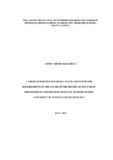PRAGMATIC RELEVANCE OF INTERPRETER MEDIATED SERMONS FROM ENGLISH TO LUHYIA, IN SELECTED CHURCHES IN BUSIA COUNTY, KENYA
Abstract
Languages convey meanings using different concepts. This makes it problematic to find equivalents between the Source Language (SL) and the Target Language (TL). Church interpreters, for example, could found it difficult to render relevant sermons since two languages (English and Luhya, in this study) cannot be compatible in terms of their lexical meanings. Such incompatibility would result in the delivery of unintended messages to the target audience. It was against this background that the present study aimed at analyzing the pragmatic relevance in interpreter mediated church sermons. Failure by interpreters to capture pragmatic equivalence in the interpreted sermons would automatically lead to a communication breakdown. The objectives of the study were: to distinguish and define levels of lack of equivalence when interpreting the sermons selected, to evaluate the constraints of attaining relevance when interpreting church sermons, to examine linguistic strategies employed by interpreters in dealing with non-equivalence during church sermon interpretation and to propose a framework for efficacy in the delivery of interpreter-mediated sermons. Relevance Theory by Sperber and Wilson (1986) was used in the study. The study adopted a descriptive research design. Data collection was done through Focus Group Discussions (FGDs), participant observation and key-informant interviews. The researcher purposively sampled two Pentecostal Churches and two mainstream churches in five Sub-Counties within Busia County. Purposive sampling was also used to identify interpreters and preachers, whereas the congregants were selected through simple random sampling. The sermons which were afterwards transcribed and then translated for analysis were recorded using an audio recorder. The interpreters’ utterances were used as units of analysis for the study. Qualitative data from FGDs, interview schedules and participant observations. The checklist was analyzed through the analysis of the available content. The study revealed that although church interpreters are important in interpreting the preachers’ utterances from the SL into the TL, there was a discrepancy between what the preachers said and what the interpreters relayed to the TL speakers. Given this, there was need for church interpreters to acquaint themselves with appropriate strategies to be employed during the interpretation of sermons for them to deliver the intended contextual meaning to the target audience. Pragmatic equivalence in the interpretation of church sermons could be problematic to attain if the interpreters did not concentrate on the levels of TL non-equivalence. This is because the task of interpreting cannot be smooth because of the structural distinctions of the SL and TL. The study recommended that although English and Luhya exhibit lexical mismatches, English-equivalence in the interpretation of church sermons could be achieved if the interpreters used appropriate strategies for dealing with non-equivalence. This would make church sermons relevant to the audience thereby enabling them to receive the preachers’ intended messages.

